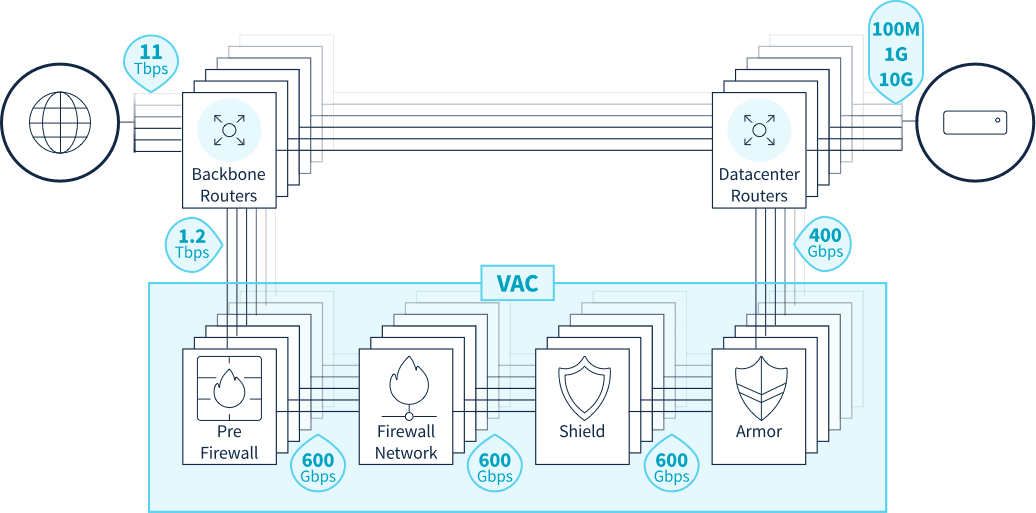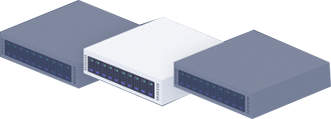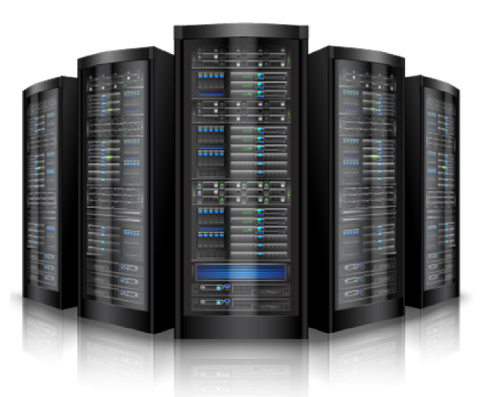Our Dedicated Servers
Grow your website faster with our Dedicated Servers.
Choose a plan that suits your requirements.
Server Location
SERVICES
Price in $
RAM:
Disks:
Include all features
Wordwide infrastructure,innovative cloud computing and specialist expertise
DDOS protection
Our servers and infrastructure are by default protected against denial of service attacks (DDoS).

RPN
The RPN is a private network functionality, dedicated and physically separated from your Internet network interface.
VMWare Ready®
Our Dedibox® servers are certified VMWare Ready®.

KVM over IP
Almost all our Dedibox® come with a hardware KVM over IP and remote virtual media as standard.

RAID
The majority of Dedibox servers support RAID, providing reliability and performance.

Assistance 24/7
Our technical assistance is available 24 hours a day, 7 days a week by ticket and telephone, in French, English and German.

Certified Datacenter
Never make any compromises about the durability of your infrastructure.

Premium network
We operate a simple, ultra fast and reliable network. Our AS12876 network has large capacities with numerous transits and exchange points.
Ultra fast cloud hosting
Benefits of the Cloud + Simplicity of Shared Hosting
- Dual 2.40GHz Xeon Processor
- 24GB RAM
- 24x7x365 Support
- 250GB RAID 1 OS Drive
- 1TB Cached Customer Drive
- Apache 2.2x
- PHP 5.3x, 5.4x, Perl, Python
- Free DNS Management
- MySQL 5
- Ruby On Rails
- Anti Spam & Virus Protection
- Secure FTP Access
- Hotlink & Leech Protection
- phpMyAdmin Access
- Online eMail Address Book
- Now with Varnish Caching
Reliable Power
Designed for Uninterrupted
Operations
Network & Security
Maximum Uptime &
Stability
HVAC Protection
Resilience and Redundancy
at All Levels

Anti-DDoS protection
infrastructures protected against DDoS attacks!
All of our dedicated servers come with the powerful GNOME anti-DDoS protection. It absorbs distributed denial-of-service attacks, and ensures that your services are always available. Anti-DDoS protection is included with all of our servers.
Keep your dedicated infrastructures protected against DDoS attacks.
GNOME offers the most powerful anti-DDoS solution on the market
It provides your services with round-the-clock protection against all types of DDoS attack, without any limitations in terms of volume or duration..
Why choose us?
Wordwide infrastructure,innovative cloud computing and specialist expertise
Solutions
Our dedicated servers are powered by high quality, enterprise grade hardware from leading players like Dell, HP and Supermicro. Built for speed and unparalleled performance.
speed
Our servers are built to deliver superior speed and ensure that even the most demanding web server applications run smoothly without any issues.
SUPPORT
Our team is consists of IT professionals in software and hardware related problems and this keeps our support quality in worlds first class.
UPTIME GUARANTEE
We are proud to offer one of the highest level of network uptime guarantee (99.95%). Your website would be always up and running.
FREQUENTLY ASKED
QUESTION & ANSWERS!

The type of web hosting plan you need depends on various factors related to your website's requirements:
-
Traffic Volume: Consider the anticipated amount of traffic your site will receive. For low to moderate traffic, shared hosting might suffice. For higher volumes, consider VPS or dedicated hosting.
-
Website Type: Different websites have different needs. E-commerce sites, for instance, might require more robust hosting with SSL certificates and security features.
-
Technical Requirements: If your site needs specific software, databases, or configurations, ensure your hosting plan supports these requirements.
-
Budget: Determine how much you're willing to invest in hosting. Shared hosting is usually more economical, while dedicated hosting tends to be more expensive.
-
Scalability: If you anticipate growth, choose a plan that allows easy scalability to accommodate increased traffic and resource demands.
-
Level of Control: Assess whether you need full control over the server (as with dedicated hosting) or if you're comfortable with shared resources and less control (as with shared hosting).
-
Support Needs: Consider the level of technical expertise you have. Managed hosting provides more support, while unmanaged hosting requires more hands-on technical knowledge.

Purchasing a dedicated hosting plan typically involves these steps:
-
Choose a Plan: Select a dedicated hosting plan that suits your website's requirements in terms of resources, scalability, and support.
-
Configure Your Server: Decide on server specifications such as CPU, RAM, storage, operating system, and any additional features or software you need.
-
Place Your Order: Visit the hosting provider's website, navigate to the dedicated hosting section, and choose your desired plan. Follow the steps to complete the purchase.
-
Customization (if offered): Some providers allow customization of server specifications. If available, configure your server according to your preferences during the ordering process.
-
Payment and Setup: Enter your payment details and complete the purchase. Upon payment confirmation, the hosting provider will set up your dedicated server and provide login/access details.
-
Manage Your Server: Once your dedicated server is set up, you'll typically receive access to a control panel or dashboard where you can manage server settings, install software, upload files, and configure security settings.
-
Support and Assistance: If you encounter any issues during setup or need assistance, contact the hosting provider's support team. They can help you with initial configurations and troubleshooting.
Remember, dedicated hosting often requires technical expertise to manage the server effectively. If you're not familiar with server administration, consider opting for managed dedicated hosting where the provider takes care of most technical aspects for you.

Congratulations on purchasing hosting! Here are the steps to get started:
-
Access Account Information: Check your email for login credentials and details regarding your hosting account. This usually includes information like control panel access, FTP details, and nameservers.
-
Log In to Your Control Panel: Use the provided login credentials to access your hosting control panel (commonly cPanel, Plesk, or a custom dashboard). This is where you manage your hosting settings, domains, emails, and files.
-
Set Up Your Domain: If you have a domain name, you'll need to point it to your hosting provider's nameservers. Update the domain settings either through your domain registrar's dashboard or contact their support for guidance.
-
Upload Your Website Files: Use FTP (File Transfer Protocol) or the file manager in your control panel to upload your website files to the server. Ensure your files are placed in the correct directory (often the 'public_html' or 'www' folder).
-
Configure Email Accounts: If your hosting plan includes email services, set up email accounts through your control panel. Configure email clients or access emails via webmail.
-
Install Necessary Software: Install any required software or applications using tools provided by your hosting control panel. For instance, you might install WordPress, Joomla, or other content management systems if needed.
-
Set Up Security Measures: Implement security measures like SSL certificates, firewalls, and regular backups. Many hosting control panels offer tools to help you manage these aspects.
-
Test Your Website: Once everything is set up, test your website to ensure it's loading correctly, all functionalities are working, and emails are sending and receiving properly.
-
Explore Support Resources: Familiarize yourself with the hosting provider's support resources, such as knowledge bases, forums, or support tickets. These can be invaluable for troubleshooting or learning more about your hosting environment.
-
Backup Your Website: Regularly back up your website to prevent data loss. Some hosting providers offer automated backup services, while others may require manual backups.

A: Consider your website's traffic volume, the type of content you'll host, your budget, technical requirements (like specific software or databases), and the level of support needed.
Q: What is the difference between shared hosting, VPS, and dedicated hosting?
A: Shared hosting shares server resources among multiple websites, VPS (Virtual Private Server) offers dedicated resources within a shared environment, and dedicated hosting provides exclusive use of an entire server.
Q: How much bandwidth and storage do I need for my website?
A: This varies based on your website's size, expected traffic, and content type. Generally, start with enough bandwidth to accommodate your expected traffic and sufficient storage for your files and databases.
Q: Should I opt for managed or unmanaged hosting?
A: Managed hosting offers support, maintenance, and technical assistance, while unmanaged hosting requires you to handle server administration tasks. Choose based on your technical expertise and time availability.
Q: Is scalability an important consideration in choosing a hosting plan?
A: Yes, especially if you anticipate growth. Ensure your chosen plan allows for easy upgrades to accommodate increased traffic and resource demands.
Q: What security features should I look for in a hosting plan?
A: Look for SSL certificates, regular backups, DDoS protection, firewalls, and robust security measures provided by the hosting provider.
Q: Can I transfer my website easily between hosting plans or providers?
A: The ease of transferring your website varies among providers. Some offer migration services, while others might require manual transfer. Choose a provider that facilitates smooth migrations if needed.
Q: How important is uptime for my website, and what uptime guarantee should I seek?
A: Uptime is crucial; it represents the time your website is accessible to users. Seek hosting providers with at least a 99.9% uptime guarantee to ensure your site remains available for visitors.
Q: What support options are available with different hosting plans?
A: Hosting providers offer various support options like live chat, phone support, ticket systems, and knowledge bases. Consider the level of support you require and the availability of these options when choosing a plan.
Q: Can I upgrade or downgrade my hosting plan as my needs change?
A: Most hosting providers allow plan upgrades or downgrades. Ensure your chosen provider offers flexible options to adjust your hosting plan as your website's needs evolve.

Dedicated Server
To rent your server directly from us is both practical and affordable. Should any hardware on
the server break as we change course it out free.

Dedicated Server
To rent your server directly from us is both practical and affordable. Should any hardware on
the server break as we change course it out free.
What Our Customers Have To Say?
Choose the best managed Cloud Hosting experience for your business!
Get started Now

 English
English



